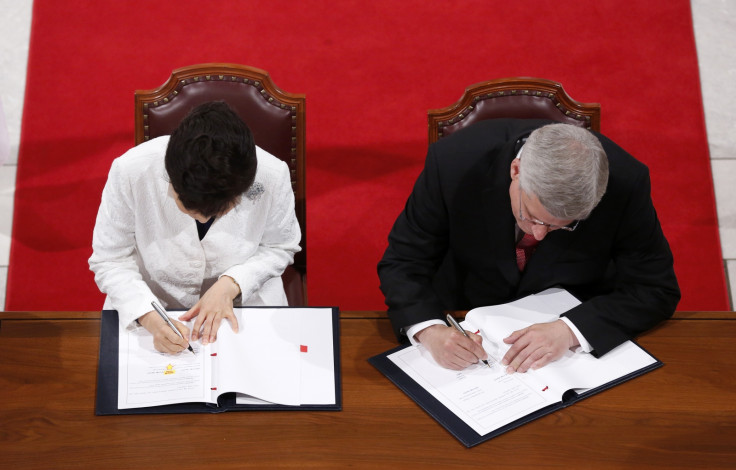Canada and South Korea Sign Free Trade Agreement

Canada has inked its first free trade agreement with an Asian country, after South Korea President Park Geun-hye jetted into Ottawa to sign on the dotted line.
Canadian Prime Minister Stephen Harper has said he hopes the agreement will boost Canadian exports to South Korea by 32% and add $1.7bn to the economy.
Park said that she hoped both sides could collaborate on various energy sectors, particularly shale gas, oil-sands crude and clean energy technology. She added: "Both sides have these strengths and advantages. This is an ideal situation for technological co-operation."
Negotiations have been ongoing for a decade, but the signature is symbolic of the rising global aspirations of both nations. Both have been keen to push free trade agendas at home and abroad, with Canada in the process of ratifying the controversial Comprehensive Economic and Trade Agreement (CETA), with Europe.
South Korea has followed up on agreements signed with the EU and US, signed in 2011 and 2012, respectively. The Korean government also entered into an agreement with Australia in April of this year.
Canada had been fearful of losing ground on its southerly neighbour with one of the most vibrant exporting countries in the world.
"For getting a foothold in terms of free trade in the Asia Pacific, there's just no better and no more ideal partner that the Republic of Korea," said Harper, at a joint news conference on Parliament Hill, Ottawa.
Canada entered into the Foreign Investment Promotion and Protection Agreement (FIPA) with China earlier in September, which will come into force on 1 October. While Canada's International Trade Minister Ed Fast said it will protect and provide confidence to Canadian investors abroad, critics have said the agreement leaves the country exposed, particularly after Harper accused China of launching a cyber-attack on Canada earlier in the summer.
Various business sectors have welcomed the latest agreement, with Pork Council of Canada – Canada exports 60% of its pork – spokesman Gary Stordy saying: "This puts us on an even playing field with many of our competitor. The US, EU and Australia all had trade agreements with South Korea, which pushed us out. Not anymore."
Guen-hye was making the first state visit to Canada by a Korean premier since 1999 and it is the first of two trade agreements to be finalised by Canada this week.
On Friday (26 September) EU officials will fly into Ottawa to sign the CETA document, after which it will be distributed to national parliaments in Canada and Europe. However, the agreement has faced strong opposition on both sides of the Atlantic.
It will be voted upon by the European Parliament MEPs will not be able to suggest amendments, simply vote for or against the agreement. It is understood that neither MPs nor MEPs have seen the text. If the UK's Trade Minister Lord Livingston wishes to see the text, he must go to a private room to view the documents, without making any copies.
While some estimate that bilateral trade could be boosted by up to 20% and could be worth a combined $20bn to the respective economies, others have questioned the fact that parliamentarians have not been privy to negotiations and will only get to vote on the final text, agreed, essentially, behind closed doors.
The Labour MP Geraint Davies told IBTimes UK that he would be encouraging his party colleagues in Strasbourg to vote against an agreement which "could come back and haunt them".
© Copyright IBTimes 2025. All rights reserved.




















